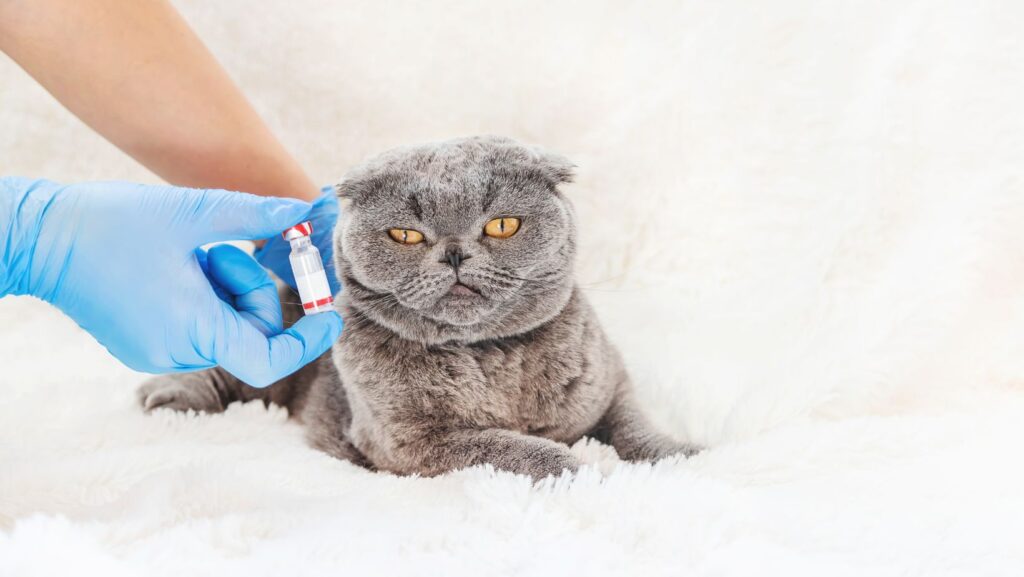
Cats are susceptible to a variety of intestinal parasites, including tapeworms, roundworms, and hookworms. To get rid of these parasites, cat owners often resort to dewormers. While deworming is an essential part of feline health care, it is not without side effects. and cure tips.
While deworming is an essential part of feline health care, it is important to be aware of potential side effects that may occur after administering deworming medication. In this article, we will discuss three common side effects of deworming in cats and provide tips on how to prevent or manage them.
1) Vomiting:
Some cats may vomit after being given a dewormer. To prevent vomiting, it is recommended to give the dewormer with food. If vomiting persists, consult a veterinarian.
2) Diarrhea:
Dewormers can disrupt the intestinal flora, leading to diarrhea. Offer your cat plenty of water and provide a bland diet of boiled chicken and rice. If diarrhea persists, contact your vet.
3) Loss of appetite:
Deworming medication can sometimes cause a temporary loss of appetite in cats. This is usually not a cause for concern, but it is important to monitor the cat’s food intake to ensure that they are still getting adequate nutrition. If the loss of appetite persists for more than a day or two, consult with your veterinarian.
4) Lethargy:
Dewormers can make cats feel tired and lethargic. Give your cat plenty of rest and monitor their behavior. If they are excessively lethargic, contact your vet.
5) Seizures:
Some dewormers can cause seizures in cats, particularly if they are given at higher than recommended doses. If your cat experiences seizures, contact your vet immediately.
6) Allergic reactions:
Cats can have allergic reactions to dewormers, which can cause skin rashes, itching, and hives. If you notice any of these symptoms, contact your vet immediately.
7) Dehydration:
Dewormers can cause dehydration due to vomiting and diarrhea. Ensure that your cat has access to clean water at all times. If they are dehydrated, contact your vet.
8) Hypersalivation:
Some cats may experience hypersalivation after taking a dewormer. This is usually a temporary side effect and will subside within a few hours.
9) Constipation:
Dewormers can cause constipation in some cats. Offer your cat plenty of water and fiber-rich food, such as canned pumpkin or psyllium husk. If constipation persists, consult your vet.
10) Behavioral changes:
Some cats may experience behavioral changes after taking a dewormer. Monitor your cat’s behavior and contact your vet if you notice any significant changes.
11) Abdominal pain:
Dewormers can cause abdominal pain and discomfort in cats. Offer your cat a warm compress and monitor their behavior. If they are in significant pain, contact your vet.
12) Fever:
Some cats may develop a fever after taking a dewormer. Monitor your cat’s temperature and contact your vet if it remains elevated for more than 24 hours.
13) Anemia:
Dewormers can cause anemia in cats by destroying red blood cells. Monitor your cat’s behavior and contact your vet if you notice signs of anemia, such as lethargy and pale gums.
14) Liver & Kidney damage:
Some dewormers can cause liver damage in cats, particularly if they are given at higher than recommended doses. Monitor your cat’s behavior and contact your vet if you notice any signs of liver damage, such as vomiting and jaundice.
Dewormers can cause kidney damage in cats, particularly if they are given at higher than recommended doses. Monitor your cat’s behavior and contact your vet if you notice any signs of kidney damage, such as excessive thirst and urination.
15) Wobbly or Unsteady Gait:
Deworming medication can sometimes affect a cat’s nervous system, causing them to have a temporary wobbly or unsteady gait. This side effect should resolve within a few hours to a day, but if it persists or worsens, consult with your veterinarian.
16) Hives on Cats:
Hives, also known as urticaria, is a common side effect of deworming medication in cats. Hives appear as small, raised, red, itchy bumps on the cat’s skin.
This side effect occurs due to an allergic reaction to the deworming medication. In severe cases, hives may cause difficulty breathing or swallowing, and the cat may require emergency veterinary care.
17) Unusual Heart Rate:
Unusual heart rate is another common side effect of deworming medication in cats. Deworming medications can cause changes in heart rate and rhythm, leading to irregular heartbeats. In severe cases, this may lead to heart failure or even death.
18) Irregular Urination or Defecation:
Deworming medication can also cause changes in urination and defecation patterns in cats. Some cats may experience diarrhea or constipation, while others may experience increased frequency or urgency to urinate.

Prevention Tips and Cure
It is essential to administer the deworming medication at the recommended dose and frequency and according to the manufacturer’s instructions only.
Ensure that your cat has access to clean water and a balanced diet during and after deworming.
Cat experiences changes in urination or defecation patterns after deworming, consult your veterinarian, who may recommend dietary changes or medication to manage the symptoms.
If your cat has a history of allergies, it is essential to inform your veterinarian before administering any medication.
If case the cat develops hives after deworming, consult your veterinarian, who may recommend antihistamines or other medications to manage the symptoms.
8 Main Factors to consider while Deworming Cats
Deworming is an essential part of feline health care as it helps to prevent and control intestinal parasites in cats. However, before deworming your cat, there are several factors you should consider. In this article, we will discuss some of the most important factors to consider while deworming cats.
- Age of Cat: Cats of different ages have different deworming requirements. Kittens should be dewormed every two weeks until they are 12 weeks old, then every month until they are six months old. Adult cats should be dewormed at least twice a year.
- Health Status: If your cat has an underlying health condition, it is important to consult a veterinarian before deworming. Certain health conditions, such as liver or kidney disease, may affect the cat’s ability to tolerate deworming medication.
- Parasite Type: Different dewormers are effective against different types of parasites. It is essential to identify the type of parasite your cat has before choosing a deworming medication.
- Weight: Deworming medication is often dosed based on the cat’s weight. It is important to weigh your cat accurately before administering any medication.
- Medication Safety: Some deworming medications may have potential side effects. It is important to read the label carefully and follow the instructions to avoid any adverse effects.
- Environment: If your cat spends time outdoors or has contact with other cats, they may be at a higher risk of contracting parasites. In such cases, more frequent deworming may be required.
- Lifestyle: Cats that hunt or eat raw meat may be at a higher risk of contracting parasites. It is important to take these factors into consideration when deciding on a deworming schedule.
- Pregnancy: Pregnant cats should be dewormed before breeding, and their kittens should be dewormed regularly. However, certain deworming medications may not be safe for pregnant cats. It is essential to consult a veterinarian before administering any medication to a pregnant cat.

My Cat Died After Deworming: Reasons Explained
Losing a cat after deworming can be devastating, and it is important to understand the potential reasons for this unfortunate event.
In rare cases, deworming medication can cause severe allergic reactions, respiratory distress, or neurological issues, leading to death.
It is also possible that the cat had an underlying health condition that was exacerbated by the medication.
If you suspect that your cat has had an adverse reaction to deworming medication, seek immediate veterinary care.
Some Related FAQ’S To Cat’s De-worming
What To Expect After Deworming A Cat?
After deworming a cat, you may notice changes in their behavior, such as lethargy or increased appetite. You may also see worms or worm segments in your cat’s feces or vomit as the medication works to expel them from the body. These symptoms should subside within a few days, but if they persist or worsen, consult with your veterinarian.
Can I Feed My Cat After Deworming?
Yes, you can feed your cat after deworming. However, it is recommended that you wait at least an hour after administering the medication before offering food to ensure that the cat does not vomit or regurgitate the medication.
Why Is My Cat Wobbly After Worming?
It is not uncommon for cats to exhibit temporary wobbliness or unsteadiness after deworming. This can be due to the medication’s effects on the cat’s nervous system or changes in the cat’s blood sugar levels. This side effect typically resolves within a few hours to a day, but if it persists or worsens, consult with your veterinarian.
Cat Not Pooping After Deworming: Why?
Deworming medication can cause changes in a cat’s digestive system, including constipation. If your cat has not defecated after deworming, it is important to monitor their behavior and consult with your veterinarian if the issue persists for more than a day or two. Increasing the cat’s water intake and offering fiber-rich foods may help alleviate constipation.
How Long Do Dewormer Side Effects Last In Cats?
The duration of dewormer side effects in cats can vary depending on the type of medication and the cat’s individual response. In general, side effects should subside within a few days after deworming. However, if the side effects persist or worsen, consult with your veterinarian.
How Long After Deworming A Cat Are The Worms Gone?
The length of time it takes for worms to be fully eliminated from a cat’s body after deworming can vary depending on the type of worm and the medication used. In general, it can take up to two weeks for all the worms to be eliminated. It is important to continue monitoring your cat’s feces for any signs of worms or worm segments during this time.
Worms Come Out Of Cat’s Bum After Deworming?
It is not uncommon for worms or worm segments to be expelled from a cat’s anus after deworming. This is a sign that the medication is working to expel the worms from the body.
It is important to continue monitoring your cat’s feces for any signs of worms or worm segments during the two weeks following deworming to ensure that all the worms have been eliminated. If you have concerns or notice any unusual symptoms, consult with your veterinarian.
Summary
In conclusion, deworming is an essential part of feline health care, but it is important to consider several factors before administering any medication. By taking these factors into account, you can ensure that your cat receives the appropriate deworming treatment and remains healthy. Consult with a veterinarian if you have any concerns or questions about deworming your cat.

Hi, This is Alexa, and I love cats. This Website is a Complete Journal about how to travel with a cat and other information about Cat Health, Cat Training, Cat Behavior, Cat Foods and more. I hope you find it useful.
